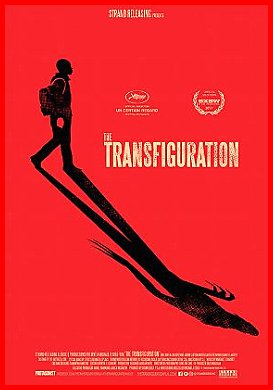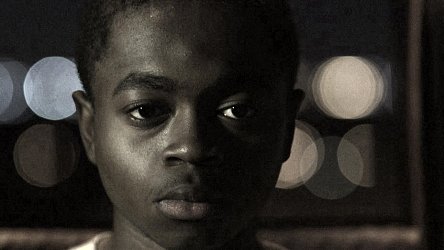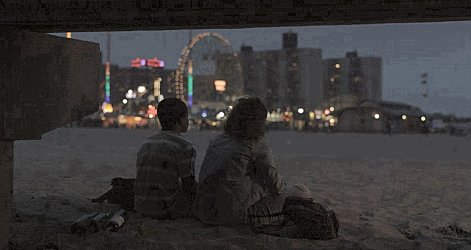|
|
| Sei in: Cinema e Medioevo ® Vampiria. Tutti i film sui vampiri ® I film in ordine alfabetico (1896-oggi) |
|
|
The Transfiguration
2016, regia di Michael O'Shea

Scheda: Nazione: USA - Produzione: Transfiguration Productions - Distribuzione: Strand Releasing, ARP Sélection, Front Row Filmed Entertainment - Soggetto: Michael O'Shea - Sceneggiatura: Michael O'Shea - Fotografia: Sung Rae Cho - Montaggio: Kathryn J. Schubert - Scenografia: Danica Pantic - Set Decoration: Amber Unkle - Costumi: Samantha Hawkins - Musiche: Margaret Chardiet - Effetti speciali: Brian Schuley, Chris Haney - Formato: Color - Durata: 97'.
Cast: Eric Ruffin, Chloe Levine, Jelly Bean, Phyillicia Bishop, Dangelo Bonneli, Andrea Cordaro, Larry Fessenden, Danny Flaherty, Anna Friedman, Jose Ignacio Gomez, Jada Jarvis, Lloyd Kaufman, Jaquan Kelly, JaQwan J. Kelly, Samuel H. Levine.






![]() Trama e commenti:
mymovies.it -
nocturno.it -
comingsoon.it -
cinematografo.it: «Lascia
uno strano sapore in bocca, The Transfiguration di Michael O’Shea, uno
stordimento insano. Sarà quel retrogusto pastoso e ferroso che il giovane
protagonista, Milo (Eric Ruffin), almeno una volta al mese non può fare a meno
di riassaporare. O questo mix di catatonia ed esplosione di violenza che
scandisce i passaggi di un brusco ritorno all’horror metropolitano, per mordere
un’adolescenza ormai apparentemente esangue e senza futuro. Per la prima volta
alla regia di un lungometraggio (un paio d’anni fa aveva realizzato il corto
Milo), O’Shea ci fa fare conoscenza con il suo protagonista dentro ad un
bagno pubblico, intento a succhiare sangue dal collo di uno sconosciuto. Per poi
svuotargli il portafoglio e, una volta tornato a casa, nascondere il maltolto in
una busta “protetta” da un muro di vhs di numerosi film sui vampiri, da
Shadow of the Vampire a
Dracula Unbound. Manca naturalmente
Twilight, perché come lo stesso Milo dirà alla nuova amica/fidanzatina giunta
da poco nel palazzo, Sophie (Chloe Levine), unica bianca in un quartiere di
neri, “non è per niente accurato”. Procedendo con andamento sincopato, il film
sorprende per la capacità di sguardo con cui il regista riesce a far muovere
Milo in una New York che, seppure a colori, ricorda i peggiori incubi ferrariani
(The Addiction, tanto per fare un nome), e convince allo stesso tempo il
continuo conflitto tra momenti di tenera intimità (tra il ragazzo e la giovane
amica) e veri e propri soprassalti di incontrollata violenza (che non risparmia
neanche una bambina), contrappuntati da un crescendo di distorsione noise
alquanto suggestiva e d’antan. È però forse troppo convinto di se stesso, O’Shea,
quando si tratta di lasciar respirare la narrazione nel suo stato più brado: gli
basta farci capire che Milo è rimasto solo (orfano, vive con il fratello
maggiore che trascorre le sue giornate sul divano a guardare la tv), senza
amici, con Sophie – anche lei con un passato traumatico alle spalle e un
presente di disagio – unico vero spiraglio per un avvenire migliore. Che
naturalmente non ci sarà. Per scelta suicida dello stesso Milo, cuore di
“vampiro”» (Valerio Sammarco).
Trama e commenti:
mymovies.it -
nocturno.it -
comingsoon.it -
cinematografo.it: «Lascia
uno strano sapore in bocca, The Transfiguration di Michael O’Shea, uno
stordimento insano. Sarà quel retrogusto pastoso e ferroso che il giovane
protagonista, Milo (Eric Ruffin), almeno una volta al mese non può fare a meno
di riassaporare. O questo mix di catatonia ed esplosione di violenza che
scandisce i passaggi di un brusco ritorno all’horror metropolitano, per mordere
un’adolescenza ormai apparentemente esangue e senza futuro. Per la prima volta
alla regia di un lungometraggio (un paio d’anni fa aveva realizzato il corto
Milo), O’Shea ci fa fare conoscenza con il suo protagonista dentro ad un
bagno pubblico, intento a succhiare sangue dal collo di uno sconosciuto. Per poi
svuotargli il portafoglio e, una volta tornato a casa, nascondere il maltolto in
una busta “protetta” da un muro di vhs di numerosi film sui vampiri, da
Shadow of the Vampire a
Dracula Unbound. Manca naturalmente
Twilight, perché come lo stesso Milo dirà alla nuova amica/fidanzatina giunta
da poco nel palazzo, Sophie (Chloe Levine), unica bianca in un quartiere di
neri, “non è per niente accurato”. Procedendo con andamento sincopato, il film
sorprende per la capacità di sguardo con cui il regista riesce a far muovere
Milo in una New York che, seppure a colori, ricorda i peggiori incubi ferrariani
(The Addiction, tanto per fare un nome), e convince allo stesso tempo il
continuo conflitto tra momenti di tenera intimità (tra il ragazzo e la giovane
amica) e veri e propri soprassalti di incontrollata violenza (che non risparmia
neanche una bambina), contrappuntati da un crescendo di distorsione noise
alquanto suggestiva e d’antan. È però forse troppo convinto di se stesso, O’Shea,
quando si tratta di lasciar respirare la narrazione nel suo stato più brado: gli
basta farci capire che Milo è rimasto solo (orfano, vive con il fratello
maggiore che trascorre le sue giornate sul divano a guardare la tv), senza
amici, con Sophie – anche lei con un passato traumatico alle spalle e un
presente di disagio – unico vero spiraglio per un avvenire migliore. Che
naturalmente non ci sarà. Per scelta suicida dello stesso Milo, cuore di
“vampiro”» (Valerio Sammarco).
![]() Plot Summary, Synopsis, Review:
IMDb -
allmovie.com
-
hollywoodreporter.com
-
theguardian.com
-
consequenceofsound.net
-
rottentomatoes.com
-
en.wikipedia.org
-
variety.com
-
abusdecine.com
-
nytimes.com:
«Young Milo has
problems. Not only is he picked on by the bullies in the New York public-housing
complex where he lives, but he also craves human blood. As if an impoverished
adolescence weren’t messy enough. We never quite learn how Milo (Eric Ruffin of
The Good Wife) becomes a vampire in
Michael O’Shea’s modestly appealing debut feature,
The Transfiguration, or whether he
simply imagines he is one and kills accordingly. But there are clues as to why.
Most concern empowerment. Milo lives with his older, protective brother, Lewis
(a worthy Aaron Clifton Moten); their parents are dead. Milo — often sequestered
in his bedroom, studying his videotape horror library (including
The Lost Boys,
but also Michael Almereyda’s indie
Nadja) —
meticulously maintains a journal of his sanguinary pursuits. When he meets
Sophie (Chloe Levine), a neighbor living with an abusive grandparent, she
appreciates his quiet, intelligent sensitivity. Of course, his penchant for
graphically violent documentaries is off-putting, but nevertheless they form a
relationship, which is eventually threatened when she discovers his notebooks.
Ms. Levine strives with her underwritten role as a flailing rag doll with a
dream. Mr. Ruffin must carry the film, projecting interior activity and
suggesting information where the script (by Mr. O’Shea) does not. That he imbues
the film with a weight greater than its words is a testament to his skill as an
actor. But The Transfiguration does have
something to say about class and the sometimes raging consequences of economic
deprivation. And does so — forgive me — with taste» (Andy Webster).
Plot Summary, Synopsis, Review:
IMDb -
allmovie.com
-
hollywoodreporter.com
-
theguardian.com
-
consequenceofsound.net
-
rottentomatoes.com
-
en.wikipedia.org
-
variety.com
-
abusdecine.com
-
nytimes.com:
«Young Milo has
problems. Not only is he picked on by the bullies in the New York public-housing
complex where he lives, but he also craves human blood. As if an impoverished
adolescence weren’t messy enough. We never quite learn how Milo (Eric Ruffin of
The Good Wife) becomes a vampire in
Michael O’Shea’s modestly appealing debut feature,
The Transfiguration, or whether he
simply imagines he is one and kills accordingly. But there are clues as to why.
Most concern empowerment. Milo lives with his older, protective brother, Lewis
(a worthy Aaron Clifton Moten); their parents are dead. Milo — often sequestered
in his bedroom, studying his videotape horror library (including
The Lost Boys,
but also Michael Almereyda’s indie
Nadja) —
meticulously maintains a journal of his sanguinary pursuits. When he meets
Sophie (Chloe Levine), a neighbor living with an abusive grandparent, she
appreciates his quiet, intelligent sensitivity. Of course, his penchant for
graphically violent documentaries is off-putting, but nevertheless they form a
relationship, which is eventually threatened when she discovers his notebooks.
Ms. Levine strives with her underwritten role as a flailing rag doll with a
dream. Mr. Ruffin must carry the film, projecting interior activity and
suggesting information where the script (by Mr. O’Shea) does not. That he imbues
the film with a weight greater than its words is a testament to his skill as an
actor. But The Transfiguration does have
something to say about class and the sometimes raging consequences of economic
deprivation. And does so — forgive me — with taste» (Andy Webster).